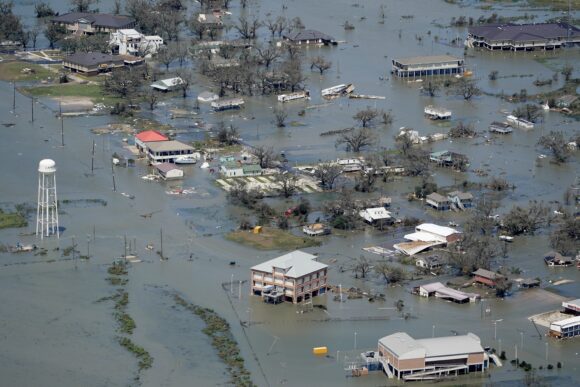BATON ROUGE, La. (AP) — As insurers in Louisiana flee the state and residents face exorbitant, and in some cases unaffordable, property insurance costs lawmakers returned to the Capitol Monday for a special legislative session to address the ongoing crisis.
In a state decimated by hurricanes in 2020 and 2021, insurance companies continue to go insolvent and leave behind tens of thousands of claims for the state’s bailout program to close out. Other companies have simply decided to leave, determining that the risk of staying in a state that has a front-row seat to climate change — where coastal areas are eaten away by erosion, there is evidence of rising sea levels and devastating hurricanes have become more frequent — outweighs the possible monetary reward.
Now, lawmakers are eyeing a bill that would allocate $45 million in excess funds to a newly created incentive program, with the hope of attracting more insurance firms to Louisiana.
“It is critical that we fund this program, which will save Louisianans money on their homeowners insurance,” Louisiana Insurance Commissioner Jim Donelon said ahead of the special session. “I’ve spoken to too many of our state’s residents and business owners struggling to make ends meet who are now seeing skyrocketing insurance costs. Some are facing being priced out of their homes.”
Currently Louisiana Citizens, the state-run insurer of last resort and the only option for many residents, has 120,000 residential policies. Prior to Hurricane Laura in 2020, there were only 36,000 policies. Those using the safety-net insurance company, which by law is the most expensive in the state, are facing a 63% rate increase on residential property insurance policies, due in large part to Louisiana’s declining number of insurers.
In an effort to lure more companies to Louisiana and reduce the number of residents relying on the costly state-run insurer, lawmakers unanimously passed an incentive program during the 2022 legislative session. Under the program, qualified companies will be awarded grants between $2 million and $10 million. In return, those companies will provide 100% matching funds for the grant they receive. In addition, the new premium required to be written by each company is at least two times that total amount.
Although lawmakers signed off on the incentive program last year, no significant money was put behind it. When The Associated Press asked Rep. Jerome Zeringue, chairman of the Appropriations Committee, why the program wasn’t funded, the Republican said it was a “good question” and one for Donelon — who lawmakers will likely press for an answer in the coming days.
While legislators and Gov. John Bel Edwards had originally hoped to address the insurance crisis during the regular session in April, Donelon insisted it couldn’t wait, citing that new insurance companies coming to the state would need reinsurance — coverage bought to ensure they can pay out claims ahead of hurricane season.
Louisiana has long faced insurance woes. Most recently, the crisis has been exacerbated by hurricanes Delta, Laura, Zeta and Ida. The storms’ destruction resulted in more than 610,000 residential property claims in the state, according to Louisiana Department of Insurance data. As a result, property insurers had paid out $18.4 billion in claims as of June 30, 2022.
Since then at least 11 companies that wrote homeowners policies in the state have gone insolvent. A dozen others have withdrawn, canceling or refusing to renew existing policies. As a result, tens of thousands of families are paying higher premiums or moving forward without any coverage at all.
But with climate change worsening and hurricanes making landfall more often, lawmakers and Donelon say the incentive program is only a Band-Aid solution, and further insurance reform will have to be addressed during the state’s April session.
Louisiana will take up two bills this special session, one allocating the $45 million and another that restricts the use of the funding in the program. Both bills have been referred to the Committee on Appropriations, which will meet Tuesday at 9:30 a.m. CST. Lawmakers must adjourn the special session no later than 6 p.m. CST on Sunday, February 5.
Louisiana is not the only state pummeled by insurance problems.
Florida has struggled to keep the insurance market healthy since 1992, when Hurricane Andrew flattened Homestead. It wiped out some insurance carriers and left many remaining companies fearful to write or renew policies. In September 2022, Hurricane Ian smashed through southwest Florida, causing an estimated $40 billion to $70 billion in property damage.
The Sunshine State has held multiple insurance-focused special sessions, most recently in December 2022 when lawmakers passed a massive Republican-authored bill seeking a $1 billion reinsurance fund, reducing litigation costs and forcing some customers to leave a state-created insurer. The legislation was designed more to keep private insurers in the state than to immediately save property owners money.
Top photo: n this Aug. 27, 2020, file photo, buildings and homes are flooded in the aftermath of Hurricane Laura near Lake Charles, La. In the past year, the southwestern Louisiana city of Lake Charles weathered two hurricanes, intense rainfall that sent water gushing down streets and a deep freeze that burst pipes. Under a revamped federal flood insurance program rolled out in the fall of 2021, millions of homeowners are set for rate hikes that officials say more accurately reflect a property’s risk. (AP Photo/David J. Phillip, File)
Was this article valuable?
Here are more articles you may enjoy.


 NYC Travel Snarled by Snow as Central Park Gets 15 Inches
NYC Travel Snarled by Snow as Central Park Gets 15 Inches  Tesla’s Austin Robotaxis Report 14 Crashes in First Eight Months
Tesla’s Austin Robotaxis Report 14 Crashes in First Eight Months  Judge Upholds $243M Verdict Against Tesla Over Fatal Autopilot Crash
Judge Upholds $243M Verdict Against Tesla Over Fatal Autopilot Crash  Asbestos Lawsuits Prompt Vanderbilt Minerals to File Bankruptcy
Asbestos Lawsuits Prompt Vanderbilt Minerals to File Bankruptcy 